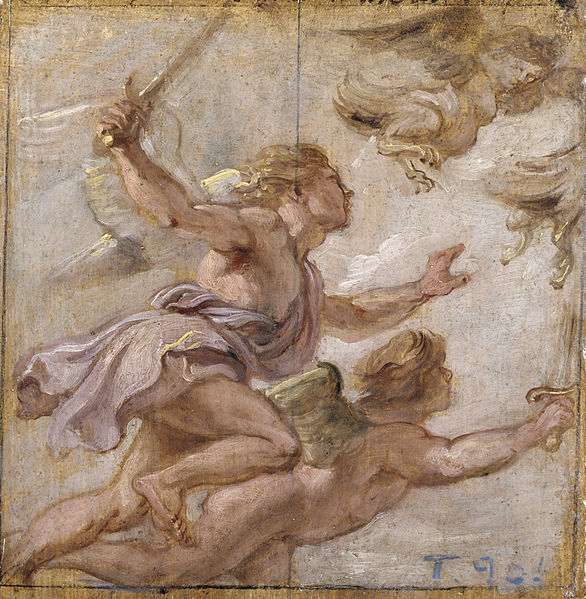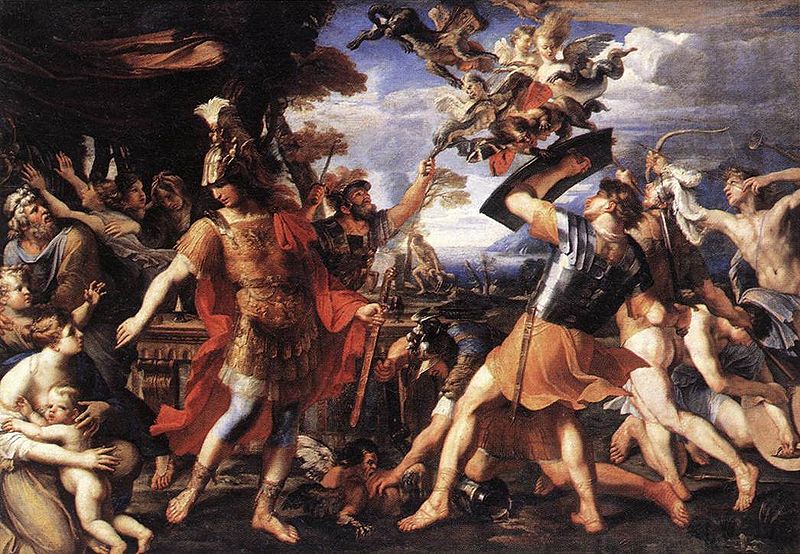THE HARPIES IN GREEK MYTHOLOGY
The Harpies were minor goddesses in Greek mythology, and were the personification of storm winds. The Harpies were generally blamed for the sudden disappearances of individuals, but more famously, the Harpies appeared in the tale of the Argonauts, when the band of heroes encountered the Harpies as they tormented King Phineus.
The Origin of the Harpies
The Harpies are generally considered to be the offspring of the ancient sea-god Thaumas, and the Oceanid Electra; which would make the Harpies sisters to the messenger goddess Iris.
Occasionally, it was said that instead that the Harpies were the daughters of Typhon (Typhoeus), the monstrous storm giant who was the husband of Echidna.
Generally speaking there were considered to be two Harpies, with Hesiod naming them as Aello (Storm-Wind) and Ocypete; though Homer names only one Harpy, Podarge (Flashing-Footed). Other writers in antiquity give the name of the Harpies as Aellopus (Storm-Footed), Nicothoe (Racing-Victor), Celaeno (Black-One) and Podarce (Fleet-Footed), though, of course, some of these might be different names for the same Harpy.
Occasionally, it was said that instead that the Harpies were the daughters of Typhon (Typhoeus), the monstrous storm giant who was the husband of Echidna.
Generally speaking there were considered to be two Harpies, with Hesiod naming them as Aello (Storm-Wind) and Ocypete; though Homer names only one Harpy, Podarge (Flashing-Footed). Other writers in antiquity give the name of the Harpies as Aellopus (Storm-Footed), Nicothoe (Racing-Victor), Celaeno (Black-One) and Podarce (Fleet-Footed), though, of course, some of these might be different names for the same Harpy.
Harpies Goddesses of the Storm Winds
|
The Harpies were the Greek goddesses of storm winds or whirlwinds, as several of the Harpies’ names suggest, and were often perceived to be the personification of the sudden and violent gusts of winds.
When people disappeared mysteriously, the Harpies would be blamed, with people often believing that the disappeared had been snatched away by the winds. |
|
The Harpies were regarded as winged women, and although initially regarded as maidens, intimating a level of beauty, it was more common to refer to their ugliness, with particular attention to long talons upon their hands, and facial features that gave an intimation of starvation.
The Harpies and the Daughters of King Pandareus
The Harpies were considered by some to be guardians of the Underworld, often acting in conjunction with the Erinyes, with the Harpies being the ones who brought people to the Erinyes for punishment.
It was said to have been the Harpies who abducted the orphaned daughters of King Pandareus, and took them to become the handmaidens of the Erinyes, much to the chagrin of Aphrodite, who had been raising them after the death of their father.
It was said to have been the Harpies who abducted the orphaned daughters of King Pandareus, and took them to become the handmaidens of the Erinyes, much to the chagrin of Aphrodite, who had been raising them after the death of their father.
The Harpies and King PhineusMore famously though, the Harpies were antagonists for the Argonauts as they sought the Golden Fleece; the Argonauts would land in Thrace and their discovered the seer Phineus, who had fallen foul of the anger of the gods, for revealing too much of what was to come, to mankind.
The punishment faced by Phineus was that whenever he sat down to a meal, the Harpies would swoop down to steal away the food, and befouled any remnants so that they were inedible. |
|
With a promise made by Phineus, to reveal how the Argo might traverse through the Symplegades, the Argonauts lay in wait for the next meal to be served.
Amongst the Argonauts were the Boreads, the twin sons of the wind god Boreas, who had the ability to fly, and so when the Harpies swooped to steal away the food, the Boreads, Zetes and Calais, took to the air, and with weapons drawn drove off the Harpies. The Boreads would chase the Harpies as far as the Strophades Islands, at which point the goddess Iris intervened, telling the sons of Boreas that they should return to the Argo, and leave the Harpies, Iris’ half-sisters, alone. Iris promised that Phineus would no longer have to fear the coming of the Harpies; although some tell of it being Apollo, rather than Iris, who told the Boreads to end their quest. For some the Strophades Islands became the new home of the Harpies, although some tell of them being found afterwards in a cave upon Crete. In both cases this presumes that the Harpies were still alive, because variations of the story of the Harpies are told where the Harpies are killed in the chase, and in some cases, so are the Boreads. |
|
Aeneas and the Harpies
The story of Phineus and the Harpies is the most famous tale about the winged women, but they do also make an appearance in another famous tale from antiquity, for the Harpies are encountered by Aeneas, in the Aeneid, by Virgil.
Aeneas and his followers would land upon the Strophades Islands, and their observing much livestock, decided to have a banquet, and to make suitable offerings to the gods. As they sat down to the banquet though, the Harpies flew down tearing the meal to pieces, and befouling the remaining food, just as they had previously done with Phineus.
Aeneas was not put off though, and so once again attempted to make sacrifices to the gods, and partake of the food, but this time Aeneas and his companions were ready, with weapons to hand. Thus when the Harpies swooped down, they were driven off, although the weapons seemed to inflict no harm upon the Harpies themselves.
Though able to drive off the Harpies, it was said that the Harpies then cursed Aeneas and his followers to suffer a period of famine when they reached their final destination, for the Harpies considered that the meat being eaten by Aeneas and his companions were theirs, and thus Aeneas had no right to it.
Aeneas and his followers would land upon the Strophades Islands, and their observing much livestock, decided to have a banquet, and to make suitable offerings to the gods. As they sat down to the banquet though, the Harpies flew down tearing the meal to pieces, and befouling the remaining food, just as they had previously done with Phineus.
Aeneas was not put off though, and so once again attempted to make sacrifices to the gods, and partake of the food, but this time Aeneas and his companions were ready, with weapons to hand. Thus when the Harpies swooped down, they were driven off, although the weapons seemed to inflict no harm upon the Harpies themselves.
Though able to drive off the Harpies, it was said that the Harpies then cursed Aeneas and his followers to suffer a period of famine when they reached their final destination, for the Harpies considered that the meat being eaten by Aeneas and his companions were theirs, and thus Aeneas had no right to it.
The Offspring of the Harpies
Away from their encounters with heroes, the Harpies were also regarded as mothers of swift horses, born from the seed of Anemoi, normally Zephyrus or Boreas.
Xanthus and Balius, the famed immortal horses of Achilles were considered to be the offspring of the Harpy Podarge and Zephyrus, whilst the horses named Phlogeus and Harpagos, who were owned by the Dioscuri, were also considered offspring of Podarge.
The immortal horses of King Erechtheus of Athens, named Xanthus and Podarces, were the sire of Boreas and the Harpy Aellopos.
Xanthus and Balius, the famed immortal horses of Achilles were considered to be the offspring of the Harpy Podarge and Zephyrus, whilst the horses named Phlogeus and Harpagos, who were owned by the Dioscuri, were also considered offspring of Podarge.
The immortal horses of King Erechtheus of Athens, named Xanthus and Podarces, were the sire of Boreas and the Harpy Aellopos.
|
|
Colin Quartermain - The Harpies - 1st September 2018

